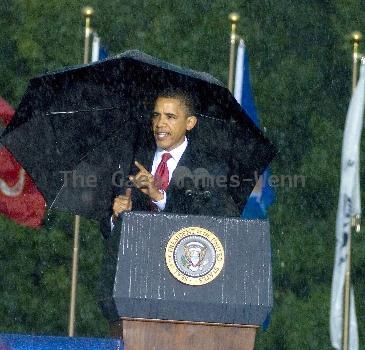Sticking points in financial overhaul are a feast for lobbyists seeking to reshape outcome
By Jim Kuhnhenn, APMonday, June 14, 2010
A lobbying tempest engulfs financial overhaul
WASHINGTON — Congress’ final tinkering with Wall Street overhaul this month offers lobbyists a last-ditch shot to reshape the package on behalf of clients with billions at stake.
Even as the legislation gets tougher on banks by the week, agents of influence are hardly strangers on Capitol Hill. Many once worked for the lawmakers they’re lobbying.
Rep. Barney Frank, chairman of a panel resolving differences in House and Senate bills, and Sen. Chris Dodd, who shepherded the Senate’s measure, have their hands full fending off industry efforts to dilute the final legislation. They must do so while trying to hold together a fragile Senate coalition with only four Republicans.
So sticking points in this legislative tempest, whether over big banks’ exotic trades or the plastic in people’s wallets, are awfully tricky.
At least 56 industry lobbyists have served on the personal staffs of the 43 Senate and House members who will shape the legislation over the next two weeks, according to Public Citizen and the Center for Responsive Politics, two government watchdogs.
What’s more, the center found that lawmakers on the committee settling differences between the House and Senate versions have received more than $112 million over two decades from political action committees or employees of industries affected by the legislation.
A look at the main issues to be settled and how lobbyists come down on them as lawmakers try to deliver on President Barack Obama’s request to give him a bill to sign by July 4.
Derivatives:
Many corporations typically use these unregulated securities as a hedge against market fluctuations. For instance, an airline may try to soften the cost of a potential rise in fuel prices by betting in the derivatives market that fuel prices will rise. But derivatives have become instruments for risky speculation. The legislation would require that they be traded in regulated exchanges.
The toughest Senate provision would force banks to shed most of their lucrative derivatives business.
The proposal’s chief advocate is Sen. Blanche Lincoln, D-Ark., who survived liberal and labor attacks during a hard-fought primary runoff largely by spotlighting her anti-Wall Street stance. Now she’s stronger in the debate.
The Obama administration and bank regulators have said her proposal goes too far.
Large banks are apoplectic, watching as it gains strength over time.
Volcker Rule:
A Senate plan known as the Volcker rule, after former Fed Chairman Paul Volcker, would prohibit banks from betting on the markets with their own money. It would let regulators determine the best way to put into place that prohibition, which would apply to all securities trades, not just derivatives.
Several Democratic lawmakers want to strengthen that by giving regulators less latitude to modify the prohibition, and by preventing financial firms from betting against securities they assemble for their clients.
Large banks see billions of dollars in trades slipping away. They prefer a House plan that merely says regulators could ban such trades. But Frank appears set on the tougher route.
Debit card fees:
Americans use debit cards more than credit cards. But their use costs merchants money: For every swipe, merchants pay 1 percent to 2 percent to banks and credit networks.
A proposal that passed the Senate would require the Federal Reserve to limit those fees, and it has created a lobbying donnybrook between banks and retailers.
Most of the fees go to banking giants. But the face of the lobbying effort has been small community banks and credit unions that say they will be disproportionately hurt if they lose such fees.
The proposal excludes banks with assets under $10 billion. Officials at small banks say their institutions still would have to lower their fees to compete with bigger banks or drop their debit card programs.
Tags: Barack Obama, Gambling, Government Regulations, Industry Regulation, Lobbying, North America, Political Issues, Recreation And Leisure, United States, Washington



